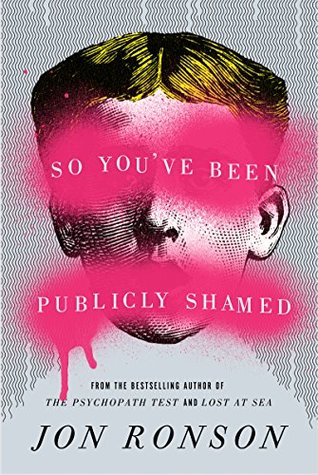More on this book
Community
Kindle Notes & Highlights
Ignominy is universally acknowledged to be a worse punishment than death . . . It would seem strange that ignominy should ever have been adopted as a milder punishment than death, did we not know that the human mind seldom arrives at truth up on any subject till it has first reached the extremity of error.
when shamings are delivered like remotely administered drone strikes nobody needs to think about how ferocious our collective power might be. The snowflake never needs to feel responsible for the avalanche.
You combine insecurity and ambition, and you get an inability to say no to things.
“I think he’s broken and that people mistake it for shamelessness,”
I suppose it’s no surprise that we feel the need to dehumanize the people we hurt—before, during, or after the hurting occurs.
“The justice system in the West has a lot of problems,” Poe said, “but at least there are rules. You have basic rights as the accused. You have your day in court. You don’t have any rights when you’re accused on the Internet. And the consequences are worse. It’s worldwide forever.”
It turns out that the concept of group madness was the creation of a nineteenth-century French doctor called Gustave LeBon. His idea was that humans totally lose control of their behavior in a crowd. Our free will evaporates. A contagious madness takes over, a complete lack of restraint. We can’t stop ourselves. So we riot, or we jubilantly tear down Justine Sacco. It
It’s called an ad hominem attack. When someone can’t defend a criticism against them, they change the subject by attacking the criticizer.
It seemed to me that all the people involved in the Hank and Adria story thought they were doing something good. But they only revealed that our imagination is so limited, our arsenal of potential responses so narrow, that the only thing anyone can think to do with an inappropriate shamer like Adria is to punish her with a shaming. All of the shamers had themselves come from a place of shame, and it really felt parochial and self-defeating to instinctively slap shame onto shame like a clumsy builder covering cracks.
All he’d worked for had been pushed away by a thing he had always considered a tiny part of his life.
“As soon as the victim steps out of the pact by refusing to feel ashamed,” he said, “the whole thing crumbles.” I reread Max’s e-mail. Could that be it? Does a shaming only work if the shamee plays his or her part in it by feeling ashamed?
Shame internalized can lead to agony. It can lead to Jonah Lehrer. Whereas shame let out can lead to freedom, or at least to a funny story, which is a sort of freedom too.
There is nothing I dislike more in the world than people who care more about ideology than they do about people.
I think we all care deeply about things that seem totally inconsequential to other people. We all carry around with us the flotsam and jetsam of perceived humiliations that actually mean nothing. We are a mass of vulnerabilities, and who knows what will trigger them?
“what if” is evidence that nothing bad actually happened.
A shaming can be like a distorting mirror at a funfair, taking human nature and making it look monstrous. Of course, it was tactics like those John Carruthers had used that compelled us to believe we could do justice better on social media. But still: Knee-jerk shaming is knee-jerk shaming
We were creating a world where the smartest way to survive is to be bland.
We see ourselves as nonconformist, but I think all of this is creating a more conformist, conservative age.
We are defining the boundaries of normality by tearing apart the people outside it.


